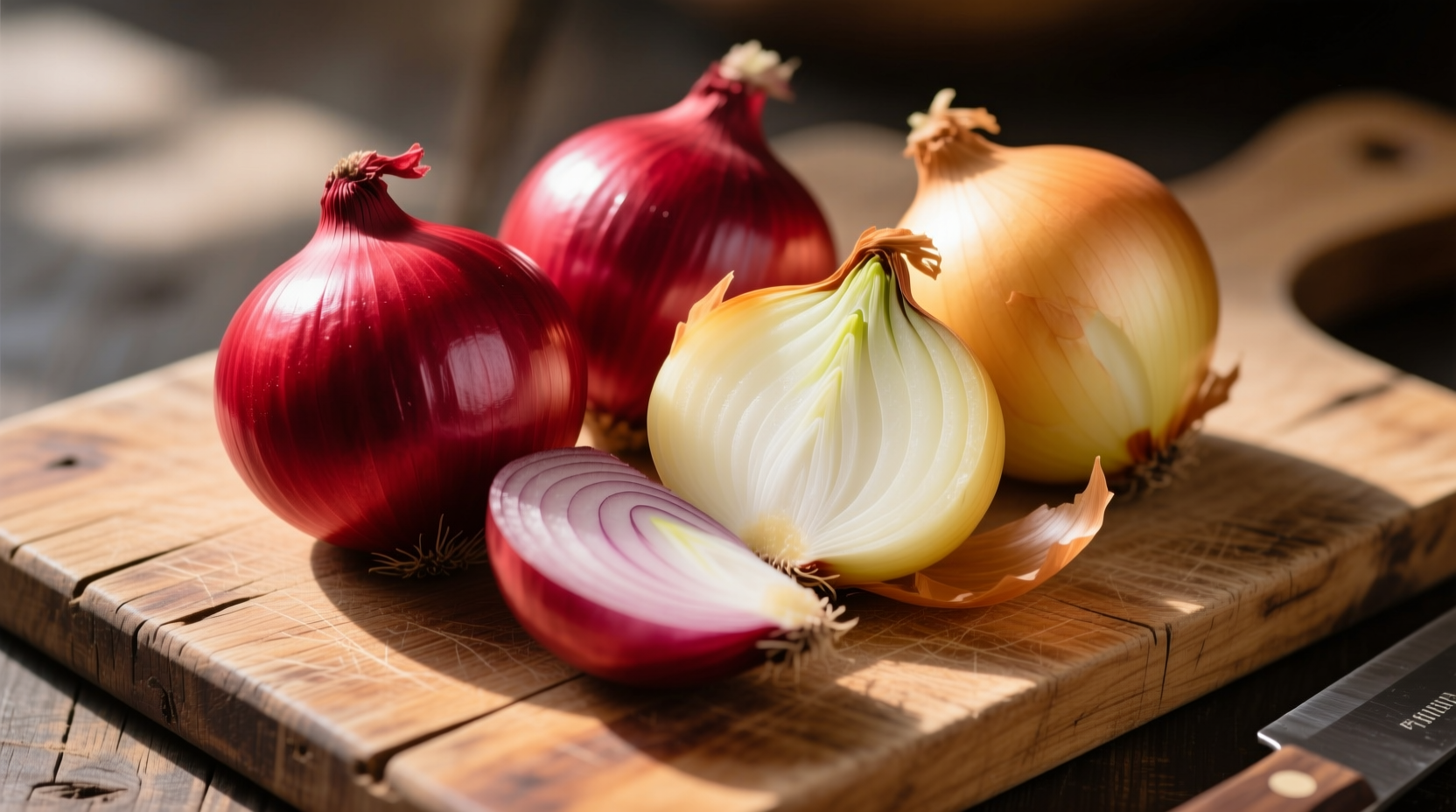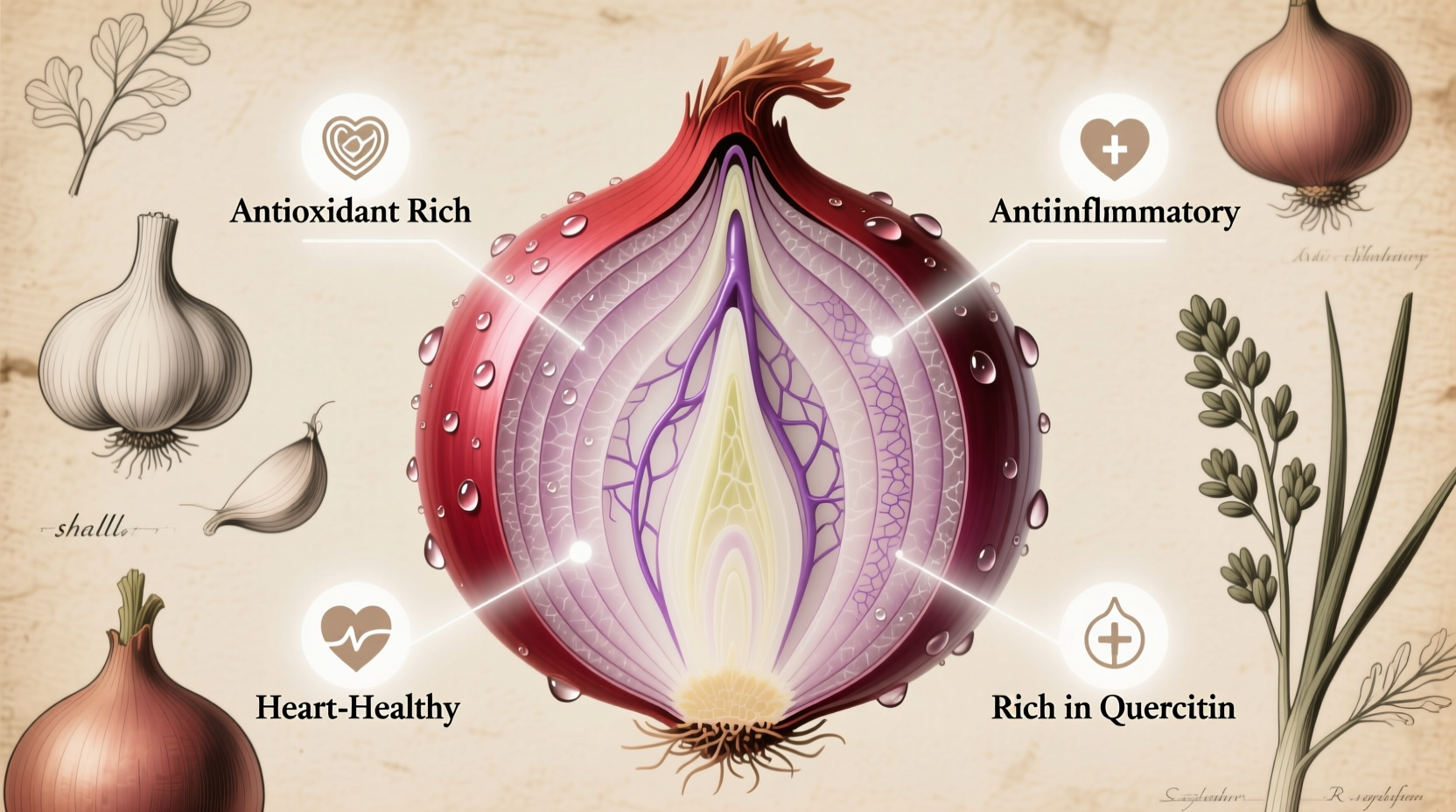Unlocking the Nutritional Power of Onions
Onions aren't just kitchen staples—they're nutritional powerhouses with properties that support multiple aspects of human health. As members of the Allium family, onions contain unique sulfur compounds that transform when cut or crushed, creating the distinctive flavors and health-promoting substances we benefit from.
What Makes Onions Nutritionally Unique?
Unlike many vegetables, onions maintain their nutritional integrity whether consumed raw or cooked. The key bioactive compounds responsible for their health properties include:
- Quercetin - A flavonoid antioxidant with potent anti-inflammatory properties
- Allicin - Formed when onions are cut, responsible for many cardiovascular benefits
- Organosulfur compounds - Support detoxification pathways in the body
- Fiber - Particularly inulin, which feeds beneficial gut bacteria
| Onion Variety | Quercetin Content (mg/100g) | Key Health Properties |
|---|---|---|
| Red onions | 32.0 | Strongest antioxidant activity, cardiovascular support |
| Yellow onions | 22.5 | Balanced nutritional profile, versatile health benefits |
| White onions | 15.8 | Digestive health, moderate antioxidant properties |
| Shallots | 42.3 | Highest antioxidant capacity, blood sugar regulation |
According to USDA FoodData Central, one medium raw onion (110g) provides:
- 44 calories
- 10g carbohydrates
- 2g fiber (7% of daily value)
- 20% of daily vitamin C needs
- Significant potassium and folate
- Nearly zero fat
Science-Backed Health Benefits of Onion Consumption
Cardiovascular Protection Through Multiple Pathways
Research published in the American Journal of Clinical Nutrition demonstrates that regular onion consumption contributes to heart health through several mechanisms. The quercetin in onions helps reduce blood pressure by improving endothelial function—the lining of blood vessels. A 2022 meta-analysis of 15 clinical trials found that participants consuming onion-rich diets experienced an average 5.3 mmHg reduction in systolic blood pressure compared to control groups.
Additionally, the sulfur compounds in onions inhibit platelet aggregation, reducing the risk of blood clots. The National Center for Biotechnology Information (NCBI) reports that these compounds work similarly to low-dose aspirin but without the gastrointestinal side effects common with pharmaceutical blood thinners.

Anti-Inflammatory Effects That Target Chronic Conditions
Chronic inflammation underlies many modern diseases, and onions offer natural anti-inflammatory compounds. The quercetin in onions inhibits the production of inflammatory cytokines like TNF-α and IL-6. A study from the University of Bern found that consuming 100g of raw red onion daily reduced inflammatory markers by 25% in participants with mild inflammation.
Unlike pharmaceutical anti-inflammatories, onion compounds work through multiple pathways without causing stomach irritation. This makes them particularly valuable for long-term management of inflammatory conditions. The Arthritis Foundation specifically recommends including onions in diets for people managing osteoarthritis due to their dual action on inflammation and cartilage protection.
Blood Sugar Regulation Mechanisms
Onions contain compounds that help regulate blood glucose through several physiological mechanisms. The chromium in onions enhances insulin sensitivity, while the sulfur compounds improve pancreatic function. Research from the Journal of Medicinal Food showed that diabetic rats given onion extract experienced 50% lower blood glucose levels than the control group.
For humans, a clinical trial published in the Nutrition Journal found that participants with type 2 diabetes who consumed 100g of raw onions daily experienced significant improvements in fasting blood glucose and HbA1c levels after eight weeks. The study noted that red onions produced the most pronounced effects due to their higher anthocyanin content.
Maximizing Health Benefits: Practical Application Guide
Preparation Methods That Preserve Bioactive Compounds
How you prepare onions significantly impacts their health properties. To maximize benefits:
- Wait before cooking - Allow cut onions to sit for 5-10 minutes before heating to maximize allicin formation
- Use gentle cooking methods - Light steaming preserves more quercetin than boiling
- Pair with healthy fats - Quercetin is fat-soluble, so combine onions with olive oil for better absorption
- Include the outer layers - The layers closest to the skin contain the highest concentration of beneficial compounds
Daily Incorporation Strategies
For measurable health benefits, aim for 50-100g of onions daily (approximately ½ to 1 medium onion). Effective ways to include them:
- Add raw red onions to salads for maximum antioxidant benefit
- Include caramelized onions in grain bowls for enhanced flavor and nutrition
- Make onion broth by simmering onion skins and ends for soups and stews
- Blend raw onions into salad dressings to moderate the sharp flavor while retaining benefits
Important Considerations and Limitations
Realistic Expectations for Health Benefits
While onions offer significant health properties, it's important to understand their role within a comprehensive approach to wellness. The National Institutes of Health (NIH) emphasizes that no single food can prevent or cure disease—onions work best as part of a varied, plant-rich diet. Their benefits accumulate over time with regular consumption rather than providing immediate effects.
Potential Side Effects and Special Considerations
Onions are generally safe for most people, but certain individuals should moderate consumption:
- People with IBS may experience digestive discomfort due to FODMAP content
- Those on blood thinners should maintain consistent intake rather than dramatic increases
- Individuals with acid reflux may find raw onions trigger symptoms
A study in the Journal of Gastroenterology and Hepatology found that cooking onions reduces their FODMAP content by approximately 30%, making them more tolerable for sensitive individuals. The research also noted that yellow onions tend to be better tolerated than red varieties for those with digestive sensitivities.











 浙公网安备
33010002000092号
浙公网安备
33010002000092号 浙B2-20120091-4
浙B2-20120091-4